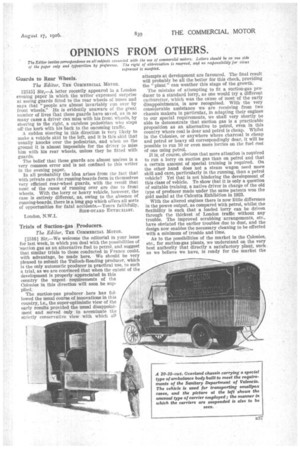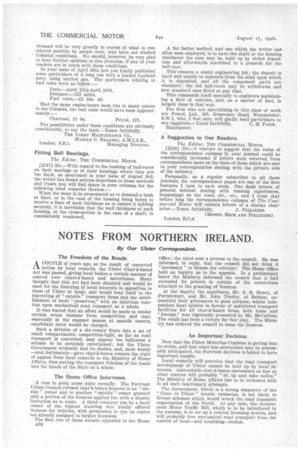OPINIONS FROM OTHERS.
Page 21

Page 22

If you've noticed an error in this article please click here to report it so we can fix it.
The Editor invites correspondence on all subjects connected with the use of commercial motors. Letters should be on one side of the pater only and typewritten by preference. The right of abbreviation is reserved, and no responsibility for views
expressed is accepted.
Guards to Rear Wheels.
The Editor, THE COMMERCIAL MOTOR.
125151 Sir,—A letter recently appeared in a London evening paper in which the writer expressed surprise at seeing guards fitted to the rear wheels of buses and says that people are almost invariably run over by front wheels." He is evidently unaware ot the great number of lives that these guards have saved, as in so many cases a driver can miss with his front wheels, by steering to the right, a careless pedestrian who steps off-the kerb With his back to the oncoming traffic.
A sudden steering in this direction is very likely to make a vehicle skid to the left, and it is this skid that usually knocks over the pedestrian, and when on the ground it is almost impossible for the driver lo miss him with his rear wheels, unless they be fitted with guards.
The belief that these guards are almost useless is a very common error and is not confined to this writer in the evening paper.
In all probability the idea arises from the fact that with private cars the running-boards form iu themselves very efficient rear-wheel guards, with the result that most of the cases of running over are due to front wheels. With the lorry or heavy vehicle, however, the ease is entirely different, as, owing to the absence of running-boards, there is a long gap which offers all sorts of opportunities for fatal accidents.—Yours faithfully, SIDE-GUARD ENTHUSIAST. London, N.W.1.
Trials of Suction-gas Producers.
The Editor, THE COMMERCIAL MOTOR.
[2516] Sir,—We welcome the editorial in your issue for last week, in which you deal with the possibilities of -suction gas as an alternative fuel to petrol. and suggest that similar trials to those conducted in Prance could, with advantage, be made here. We should be very pleased to submit the Tulloch-Reading producer, which is the only automatic producer in practical use, to such a trial, as we are convinced that when the extent of the development is properly appreciated in this country the urgent requirements of the Colonies in this direction will soon be supplied.
The suction-pas producer here has followed the usual course of innovations in this country, i.e., the super-optimistic view of the early results provided the usual disappointanent and served only to accentuate the strictly conservative view with which all attempts at development are favoured. The final result will probably be all the better for this check, providing the " plant " can weather this stage of the growth.
The mistake of attempting to fit a suction-gas producer to a standard lorry, as one would try a different carbUretter, which was the cause of most of the early disappointments, is now recognized. With the very considerable assistance we are receiving from two chassis makers in particular, in adapting their engines to our special requirements, we shall very shortly be able to demonstrate that suction gas is a practicable proposition as an alternative to petrol, even in this country where coal is dear and petrol is cheap. Whilst in the Colonies, or anywhere where charcoal is cheap and petrol or heavy oil correspondingly dear, it will be possible to run 10 or even more lorries on the fuel cost of one using petrol.
It is, of course, obvious that more attention is required to run a lorry on suction gas than on petrol and that a certain amount of special training is required. On the other hand does not a steam wagon need more skill and care, particularly in the running, than a petrol vehicle? Yet that is not hindering the development of this class of vehicle. To show that it is only a question of suitable training, a native driver in charge of the old type of producer made under the same patents won the gold medal at the Calcutta Exhibition in 1923.
With the altered engines there is now little difference in the power output, as compared with petrol, whilst the flexibility is such that a loaded lorry can be driven through the thickest of London traffic without any trouble. The improved scrubbing arrangements, etc., have obviated the earlier troubles due to dust, and the design now enables the necessary cleaning to be effected with a minimum of trouble and time.
As to the possibilities of the market in the Colonies, etc., for suction-gas plants, we understand on the very best authority that directly a satisfactory plant, such as we believe we have, is ready for the market the demand will be very greatly in excess of what is considered possible by people here, who have not studied Colonial conditions, We should, however, be very glad to hear further opinions in this direction, if any of your readers are in touch. with these conditions.
In your issue of April 20th last you kindly published some particulars of a long run with a loaded Leyland lorry using suction gas. The• particulars relating to fuel costs were as follow :— Date.—April 15th.-April 24th. Distance.-525 Fuel costs.--I2 10s. 4d.
Had the same engine-hours been run in many places in the Colonies, the fuel costs would have been approximately :— Charcoal, £1 6s. Petrol, £21.
The possibilities under these conditions are obviously
considerable, to say the least.—Yours faithfully, THE LORRY MAINTENANCE CO., HAROLD C. READING, A.M.I.A.E., .
London, S.E.1. Managing Director.
Fitting Ball Bearings.
The Editor, THE COMMERCIAL MOTOR.
[25171 Sir,—With regard to the bushing of ball-races on their seatings or in their housings where they are too slack, as mentioned in your issue of August 3rd, the writer has found serious objections to those methods and trusts you will find space in your columns for the following brief remarks thereon :—
When the wear is so pronounced as to demand a bush or liner, or in the case of the housing being bored to receive a liner a such thickness as to ensure it holding securely, it is inevitable that the wall thickness of such housing, or the cross-section in the case of a shaft, is considerably weakened.
A far better method, and one which the writer has often seen employed, is to have the shaft or the housing whichever the case may be, built up by nickel deposition and afterwards machined to a press-fit for the ball-race.
This ensures a sound engineering job ; the deposit is hard and unable to separate from the steel upon which t is deposited, and all the component parts are standard ; the old ball-races may be withdrawn and new standard ones fitted at any time.
This commends itself specially to engineers maintainng a fleet of vehicles, and, as a matter of fact, is argely done in that way.
The firm who are specializing-in this class of work are Fescol, Ltd., 101, Grosvenor Road, Westminster, .W.1, who, I feel sure, will gladly send particulars to
any inquirers.—Yours faithfully, C. H: PARIS. Manchester.
Suggestion to Our Readers.
The Editor, THE COMMERCIAL MOTOR.
a [2518] venture to suggest that the value of he correspondence columns in your journal could be onsiderably increased if letters were received from orrespondents more on the lines of those which are sent o your contemporaries dealing with the private side f the industry.
Personally, as a regular subscriber to all these ournals, the correspondence pages are one of the first I eatures I turn to each week. One finds letters of general interest dealing with running experiences, appenings on the road, etc., etc., and I trust that efore long the correspondence columns of The Commercial Motor will contain letters of a similar char cter.—Yours faithfully, J. POLLITZER
t C C C
(Messrs. BECK AND POLLITZER).
London, E.C.4.




























